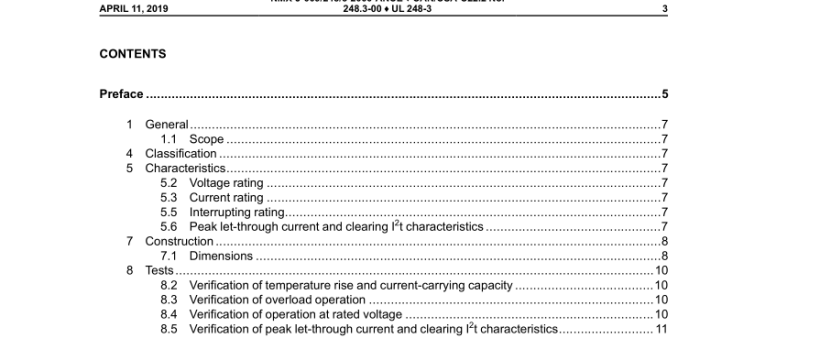UL 248-3 2019 pdf download.Low-Voltage Fuses – Part 3: Class CA and CB Fuses.
1 General NOTE – This Part is intended to be read togetherwith the Standard forLow-Voltage Fuses – Part 1: General Requirements, hereafterreferred to as Part 1. The numbering ofthe Clauses in this Part correspond to like numbered Clauses in Part 1. The requirements ofPart 1 apply unless modified by this Part. For Clauses not shown below, refer to the Standard for Low-Voltage Fuses – Part 1: General Requirements, NMX-J-009/248/3-2000-ANCE ♦ CAN/CSA C22.2 No. 248.1 ♦ UL 248-1. 1.1 Scope This Part applies to Class CA and CB fuses rated 60 A or less and 600 Vac. DC ratings are optional. 4 Classification Class CA and CB fuses are non-renewable and current limiting, with an interrupting rating of 200,000 A. Class CA fuses have one body size. Class CB fuses are divided into two body sizes. The maximum current rating, I n , for each size is specified in this Part. 5 Characteristics 5.2 Voltage rating For AC, the rating shall be 600 Vac. The DC voltage rating may be different from the AC rating. 5.3 Current rating Class CA fuses shall be rated 30 A or less. Class CB fuses shall be rated 60 A or less. Refer to Figure B for range of current ratings in each body size. 5.5 Interrupting rating For AC – 200,000 A For DC, the preferred ratings are 10,000, 20,000, 50,000, 100,000, 150,000, or 200,000 A. 5.6 Peak let-through current and clearing I 2 t characteristics Maximum values of peak let-through current and clearing I 2 t are given in Table A.
8 Tests 8.2 Verification of temperature rise and current-carrying capacity 8.2.3 Test method 1.0 I n – Temperature rise 1.1 I n – Current-carrying capacity, I nf 8.2.3.1 Fuses rated 600 A or less In addition to the requirements in Part 1: At the conclusion of the temperature rise test, the test current shall be increased without interruption to 1.1 I n for a period of not less than 15 min. Temperature is not to be monitored during this time. 8.2.4 Acceptability of test results In addition to the requirements in Part 1: The maximum temperature rise shall not exceed the following: Contacts – 75°C 8.3 Verification of overload operation Part 1, Table 4 Test 1 – 1.35 I n Test 3 – 2.0 I n 8.4 Verification of operation at rated voltage For AC – Part 1, Table 5 Test 1 – 200 kA Test 2 – Maximum energy Test 3 – Threshold ratio. The maximum threshold ratio shall be 60. Test 5b – 2 I n Peak let-through current and clearing I 2 t recorded during Test 1. For DC – Part 1, Table 6 Test 1 – Interrupting rating Test 2 – Maximum energy Test 5c – 2 I n
8.5 Verification of peak let-through current and clearing I 2 t characteristics 8.5.3 Acceptability of test results Peak let-through current and clearing I 2 t values recorded shall not exceed the limits specified in Table A.UL 248-3 2019 pdf download.
UL 248-3-2019 pdf download
